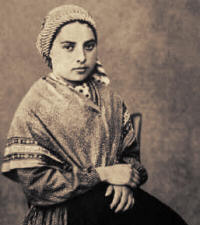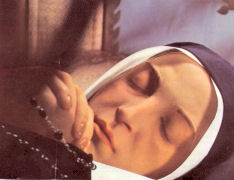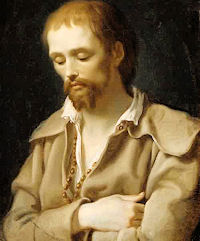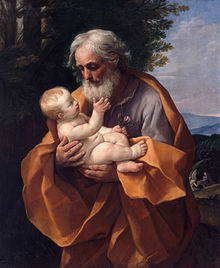30. They said therefore to him, What sign show you then, that we may see, and believe you? what do you work?
31. Our fathers did eat manna in the desert; as it is written, He gave them bread from heaven to eat.
32. Then said Jesus to them, Verily, verily, I say to you, Moses gave you not that bread from heaven; but my Father gives you the true bread from heaven.
33. For the bread of God is he which comes down from heaven, and gives life to the world.
34. Then said they to him, Lord, evermore give us this bread.
AUG. To eat then that meat which endures to everlasting life, is to believe in Him. Why do you make ready your tooth and your belly? Only believe, and you have eaten already. As He called on them to believe, they still asked for miracles whereby to believe; They said therefore to Him, What sign show you then, that we may see and believe You? What do you work?
CHRYS. Nothing can be more unreasonable than their asking for another miracle, as if none had been given already. And they do not even leave the choice of the miracle to our Lord; but would oblige Him to give them just that sign, which was given to their fathers: Our fathers did eat manna in the desert.
ALCUIN. And to exalt the miracle of the manna they quote the Psalm, As it is written, He gave them bread from heaven to eat.
CHRYS. Whereas many miracles were performed in Egypt, at the Red Sea, and in the desert, they remembered this one the best of any. Such is the force of appetite. They do not mention this miracle as the work either of God, or of Moses, in order to avoid raising Him on the one hand to an equality with God, or lowering Him on the other by a comparison with Moses; but they take a middle ground, only saying, Our fathers did eat manna in the desert.
AUG. Or thus; Our Lord sets Himself above Moses, who did not dare to say that He gave the meat which perishes not. The multitude therefore remembering what Moses had done, and wishing for some greater miracle, say, as it were, you promise the meat which perishes not, and does not works equal to those Moses did. He gave us not barley loaves, but manna from heaven.
CHRYS. Our Lord might have replied, that He had done miracles greater than Moses: but it was not the time for such a declaration. One thing He desired, viz. to bring them to taste the spiritual meat: then Jesus said to them, Verily, verily, I say to you, Moses gave you not that bread from heaven; but My Father gives you the true bread from heaven. Did not the manna come from heaven? True, but in what sense did it? The same in which the birds are called, the birds of heaven; and just as it is said in the Psalm, The Lord thundered out of heaven. He calls it the true bread, not because the miracle of the manna was false, but because it was the figure, not the reality. He does not say too, Moses gave it you not, but I: but He puts God for Moses, Himself for the manna.
AUG. As if He said, That manna was the type of this food, of which I just now spoke; and which all my. miracles refer to. You like my miracles, you despise what is signified by them. This bread which God gives, and which this manna represented, is the Lord Jesus Christ, as we read next, For the bread of God is He which comes down from hearer, and gives life to the world.
BEDE. Not to the physical world, but to men, its inhabitants.
THEOPHYL. He calls Himself the true bread, because the only-begotten Son of God, made man, was principally signified by the manna. For manna means literally, what is this? The Israelites were astonished at first on finding it, and asked one another what it was. And the Son of God, made man, is in an especial sense this mysterious manna, which we ask about, saying, What is this? How can the Son of God be the Son of man? How can one person consist of two natures?
ALCUIN. Who by the humanity, which was assumed, came down from heaven, and by the divinity, which assumed it, gives life to the world.
THEOPHYL. But this bread, being essentially life, (for He is the Son of the living Father,) in quickening all things, does but what is natural to Him to do. For as natural bread supports our weak flesh, so Christ, by the operations of the Spirit, gives life to the soul; and even incorruption to the body, (for at the resurrection the body will be made incorruptible.) Wherefore He says, that He gives life to the world.
CHRYS. Not only to the Jews, but to the whole world. The multitude, however, still attached a low meaning to His words: Then said they to Him, Lord, evermore give us this bread. They say, Give us this bread, not, Ask Your Father to give it us: whereas He had said that His Father gave this bread.
AUG. As the woman of Samaria, when our Lord told her, Whosoever drinks of this water shall never thirst, thought He meant natural water, and said, Sir, give me this water, that she might never be in want of it again: in the same way these say, Give us this bread, which refreshes, supports, and fails not.
35. And Jesus said to them, I am the bread of life: he that comes to me shall never hunger; and he that believes in me shall never thirst.
CHRYS. Our Lord now proceeds to set forth mysteries; and first speaks of His Divinity: And Jesus said to them, I am the bread of life. He does not say this of His body, for He speaks of that at the end; The bread that I will give you is My flesh. Here He is speaking of His Divinity. The flesh is bread, by virtue of the Word; this bread is heavenly bread, on account of the Spirit which dwells in it.
THEOPHYL. He does not say, I am the bread of nourishment, but of life, for, whereas all things brought death, Christ has quickened us by Himself. But the life here, is not our common life, but that which is not cut short by death: He that comes to Me shall never hunger; and, He that believes in Me shall never thirst.
AUG. He that comes to Me, i.e. that believes in Me, shall never hunger, has the same meaning as shall never thirst; both signifying that eternal society, where there is no want.
THEOPHYL. Or, shall never hunger or thirst, i.e. shall never be wearied of hearing the word of God, and shall never thirst as to the understanding: as though He had not the water of baptism, and the sanctification of the Spirit.
Catena Aurea John 6


 For some years she suffered greatly from the suspicious disbelief of some and the tactless enthusiasm and insensitive attentions of others; these trials she bore with impressive patience and dignity. In 1866 she was admitted to the convent of the Sisters of Charity at Nevers. Here she was more sheltered from trying publicity, but not from the 'stuffiness' of the convent superiors nor from the tightening grip of asthma. 'I am getting on with my job,' she would say. 'What is that?' someone asked. 'Being ill,' was the reply. Thus she lived out her self-effacing life, dying at the age of thirty-five. The events of 1858 resulted in Lourdes becoming one of the greatest pilgrim shrines in the history of Christendom. But St Bernadette took no part in these developments; nor was it for her visions that she was canonized, but for the humble simplicity and religious trustngness that characterized her whole life.
For some years she suffered greatly from the suspicious disbelief of some and the tactless enthusiasm and insensitive attentions of others; these trials she bore with impressive patience and dignity. In 1866 she was admitted to the convent of the Sisters of Charity at Nevers. Here she was more sheltered from trying publicity, but not from the 'stuffiness' of the convent superiors nor from the tightening grip of asthma. 'I am getting on with my job,' she would say. 'What is that?' someone asked. 'Being ill,' was the reply. Thus she lived out her self-effacing life, dying at the age of thirty-five. The events of 1858 resulted in Lourdes becoming one of the greatest pilgrim shrines in the history of Christendom. But St Bernadette took no part in these developments; nor was it for her visions that she was canonized, but for the humble simplicity and religious trustngness that characterized her whole life.  Saint Benedict Joseph Labre, born on March 26, 1748 in northern France, exemplifies a very particular kind of holiness found in both East and West. He was a wanderer who prayed ceaselessly, a pilgrim walking from one holy place to another, a fool for Christ.
Saint Benedict Joseph Labre, born on March 26, 1748 in northern France, exemplifies a very particular kind of holiness found in both East and West. He was a wanderer who prayed ceaselessly, a pilgrim walking from one holy place to another, a fool for Christ. 
